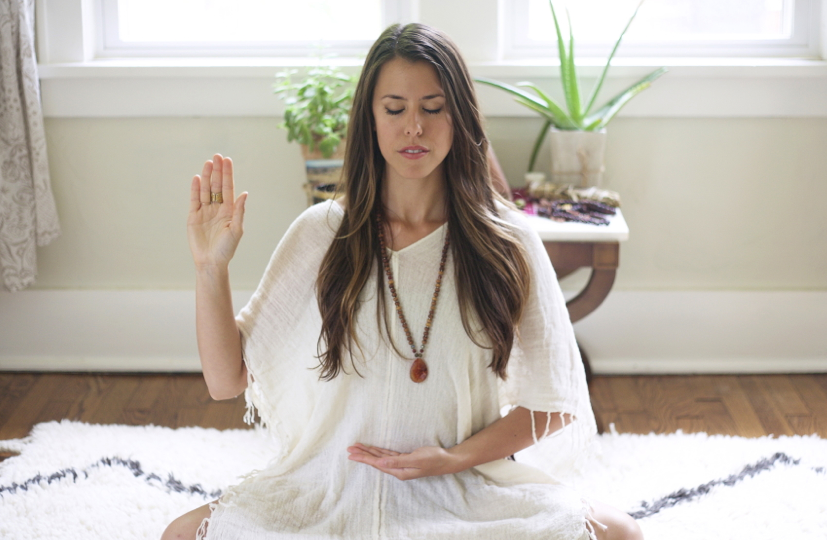The word “Abhaya” holds multiple meanings and was commonly used in ancient India when Sanskrit was the primary language of communication. In those times, Abhaya symbolized fearlessness. Additionally, it can also represent protection, peace, and silence. The Abhaya mudra, a hand gesture, signifies the detachment of fear and evil from one’s life and is believed to have existed before Buddhism.

This mudra was initially intended as a friendly gesture when approaching strangers, promoting harmonious interactions. Another theory suggests that Gautam Buddha’s use of this gesture calmed an attacking elephant. The Abhaya mudra finds significance in various historical traditions, including Gandhara art and Buddhist practices. In Thailand and Laos, it is even known as the “walking Buddha” mudra.
How To Do Abhaya Mudra
To practice this mudra effectively, it is important to understand the correct method. Firstly, ensure that your body is relaxed and not strained. Avoid exerting excessive pressure or tension while performing the mudra. It is crucial to free your mind from worldly distractions and focus solely on the mudra. This will allow you to reap long-term benefits from its practice. Remember not to indulge in negative thoughts or doubts that might hinder your progress in achieving the desired results.
Here are some simple steps to perform Abhaya Mudra, all you have to do is follow these steps:
- Find a comfortable position for the mudra exercise, such as sitting in a lotus or half-sitting position.
- Prioritize comfort and use a mat or light carpet underneath you instead of sitting directly on a bare floor.
- You can choose to keep your eyes open or closed during the exercise, with closed eyes promoting better concentration.
- Raise your right hand up to shoulder height and bend your arms, turning your palms outward with fingers upright.
- Join your right hand with your left hand while remaining in a standing position.
- Clear your mind of unnecessary thoughts and aim to stay relaxed throughout the exercise.
- Enhance your concentration by chanting the sacred sound of “OM” if desired.
- Allow your breathing to flow naturally and do not consciously control your breath during the exercise.
- Perform the mudra posture for three repetitions, ideally for around 10 to 12 minutes.
- Gradually open your eyes and release the fearless mudra by bringing your hand down after completing the exercise.
Tips and Tricks to Do Abhaya Mudra
There is no specific time to do the Abhaya mudra, as it can be done whenever you wish. It doesn’t require a specific sitting pattern and can even be done while standing or on the go. In the office, when you feel bored or need a break, you can practice the Abhaya mudra to overcome fear and enjoy its benefits. It is essential to conquer fear and jealousy in today’s competitive world in order to succeed in life. Regular practice of the Abhaya mudra can bring positive changes to your life and lifestyle, as recommended by doctors.
However, it’s important to understand that mastering the Abhaya mudra takes time. Instant results are not achievable with unhealthy practices. It requires consistent practice over a long period to overcome fear and jealousy. The process is more about mental transformation than physical changes, so it requires patience and persistence. Don’t lose hope if you don’t see immediate results. With confidence, correct practice, time, and patience, you will eventually achieve the desired outcomes.
Benefits of Abhaya Mudra
- The Abhaya mudra, a yoga hasta mudra, is easy to perform and offers multiple benefits.
- It can soothe the mind by helping control emotions like irritability, anger, and anxiety, promoting calmness.
- This mudra enhances spiritual energy by awakening chakras and allowing the free flow of spiritual energy.
- By practicing the Abhaya mudra, a sense of spiritual security is created within oneself.
- It also helps conquer fear, an essential aspect of achieving success, by promoting fearlessness and preventing it from hindering progress in life.
Side Effects of Abhaya Mudra
Practicing Abhaya mudra can lead to attaining peace, good intentions, and openness of mind. This hand gesture is generally safe and does not typically result in any side effects. However, it is important to be aware of your own comfort level while performing Abhaya mudra. If you feel uncomfortable at any point, it is advisable to stop doing the gesture immediately. By paying attention to your body’s response, you can ensure a positive and comfortable experience with Abhaya mudra.
Abhaya Mudra or any mudra is a crucial element of yoga. When incorporated with meditation, this Mudra aids in combating inner fears. Regular practice of this Mudra can bring tranquility, stillness, and assurance to your life. If you found this article useful, kindly share your feedback with us!
